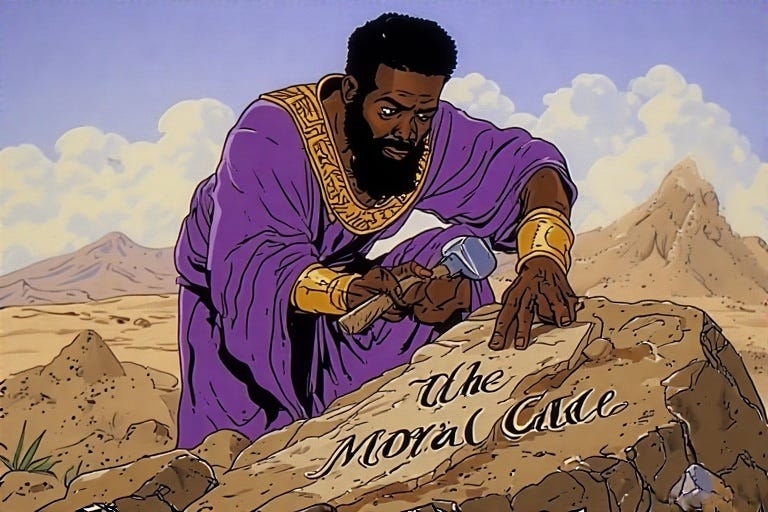What is a "Law" Anyway? - part 1
post 91 – Illogical Nation No. 7 - Scientific and Moral Law
I don’t consider myself a protest singer, but whether deserved or not, folk music is associated in the public eye with protest singers and protest songs. I also believe that we musicians reflect and promote values with the songs we sing, whether we like it or not. So, in order to do my job right, I believe I need to understand what I’m talking about. Here’s one little piece of what I have observed.
There are all kinds of talk lately about “the rule of law” and “Constitutional Law.” Other phrases I hear used include “against the law,” unlawful,” “Shariah Law,” “MAGA Law,” and “there should be a law against that.” But what exactly is a law?
Way back in January 1986, I discussed this question with my then-new friend Paul Mugwart at the San Francisco Airport. Paul is what I call a “Wisdom Catcher.” He is filled with wisdom, a majority of which he “caught” from other “wise” people, literature, songs, and speakers, but also from you and me, from the people he runs into along his way. Paul has curated much of that wisdom and put his own touch on it. He doesn’t just regurgitate words; he applies thought and introspection to them.
PUTTING THE CART BEFORE THE DONKEY
While talking with me and another young man at the airport, Paul used the term “Spiritual Law.” The other fellow asked, “Who has the right to decide what is and isn’t a spiritual law?” Paul answered, “You’ve got it backwards. Nobody decides what a law is. But people can discern it.”
In other words, spiritual laws - and physical laws, too - already exist whether we understand them or not. But we can learn how they work and live in harmony with them, thereby “mastering” our lives.
Yesterday, Paul and I met at my satellite office in the Ellinokon Café, in Highland Park, New Jersey for a cup of iced coffee and Paul explained again what he means by “discerning” laws.
HOW THINGS WORK
Paul: My experience tells me that if we were to boil the word “law” down to its simplest definition, it would be “how things work.”
Spook: That’s what I’ve been saying.
Paul: Let’s put the wide variety of laws into four categories: Laws of Physics and Math, the Moral Code, “Man-made” Laws, and Spiritual Laws. Metaphysics is often considered a subcategory of spiritual law, but really isn’t, and shouldn’t be mistaken for such.
Spook: Where do we start?
THE LAW OF GRAVITY
Paul: Gravity. If you hold an apple at arm’s length and let go, the apple falls in accordance with the law of gravity.
Spook: That’s very simple.
Paul: It should be. It’s probably the first law every conscious being learns, at least on this planet. Things go down if you let go of them. Even in water, where air bubbles go up, they still follow the laws of gravity.
Now, we humans have gone further in our understanding of this law and figured out the way it works, too. Maybe not why it works, but how. The Law of Gravity allows us to calculate, for example, the time it would take for a monkey dropping from a branch to reach the ground.
THE LAWS OF PHYSICS
We’ve also figured out other laws of physics, such as the laws of thermodynamics, the laws of buoyancy, and more. These laws describe how things work.
Spook: I googled “list some scientific laws,” and the page that came up was titled “How Thing Works.”
Paul: That sounds right. Nobody made up these laws. They figure them out.
THE LAWS OF MATH
Now, alongside the laws of physics are the laws of mathematics. Like the laws of physics, they tell us how things work, but this time in the world of mathematics. There is one subtle but profound difference. We have solved amazing mathematical problems by “bending” the laws of math, by asking “what if it worked a different way?” As a result, we’ve created “Non-Euclidean Geometry,” the square root of negative one, and other anomalous mathematical systems.
Spook: Ouch!
Paul: Yes. It’s heady stuff. But what’s important here is simply that the Laws of Physics and Mathematics describe how the physical and mathematical worlds work. Alongside these, but slightly more flexible, are the Laws of Logic. They tell us how logic works.
THE MORAL CODE
Spook: Cool. So, what about Social Laws?
Paul: Ah! The Moral Code, ethics, by-laws of a corporation or social club, mom and pop (maybe). These are “laws” that tell us how society works and how to behave if we want society to continue to work. For example, if you covet your neighbor’s spouse, that could cause trouble. If you go to the country club dressed like a slob, that can cause trouble, too.
Spook: And create karma.
Paul: Yes, but let’s talk about karma later. If we look only at social laws, we see that if we let people steal, lie, and cheat without accountability, society will break down. This is a gross simplification, but Moral laws describe how society works or doesn’t work.
Spook: How do we figure these laws out?
Paul: Ah! This is perhaps the most important question about law - how do we figure it out? We figure out physical laws through trial and error. Every time, without fail, if you let go of the apple, it will fall. But moral laws are different. Sometimes people lie and get away with it. Every time someone lies, a different result occurs. So, how do we figure out the moral code?
THE LAW OF MOSES
Let’s look at Moses. And let’s not underestimate the importance of the Ten Commandments in today’s society. All kinds of political agendas involve the Ten Commandments. Many of them use the Ten Commandments as cover for doing really bad things. And the separation of church and state is at stake. The future of our society depends upon our understanding of what a law is and how we devise it.
So, we need to understand how Moses received the Ten Commandments. And I assure you, if you explore this question and follow it as far as it will take you, you will discover everything you need to know about “laws.”
We need to ask, did Moses really get these laws from “God?” Did God really “speak” to Moses? Or, at the opposite extreme, did Moses simply apply a heavy dose of logic? Did he think really hard about it? Did he make it up out of thin air? Or was he “divinely inspired?”
GOING TO THE MOUNTAIN TOP
If you think God is some all-powerful old man up in the clouds who spoke to Moses in words, you might miss the deeper lesson. At the other extreme, if you believe the concept of God is utter nonsense, you can also miss the gift. But if you take the middle path and explore what exactly the process was by which Moses “received” these laws, you can benefit greatly.
Spook: How?
Paul: You can learn to use the same process to make your own decisions. Decisions about health, business, art, social interaction. Suppose you believe you’ve been wronged by somebody. How do you deal with it? The Ten Commandments might give you some limited guidance, but probably won’t apply to the specific details of your specific experience. Likewise, getting a lawyer could provide a limited solution. But what if you can learn to go to the proverbial “mountain top” yourself and figure out the best course of action? Figure out what works best in this situation. There are a thousand ways to do this.
Spook: Give me one.
Paul: Ask yourself how you want things to work out. What will work to bring you there? The answer may include following the moral code and/or getting a lawyer, but ultimately, it can be found in the depths of your heart.
MORAL CODES AND MORAL DILEMMAS
Spook: Here’s a dilemma. We’ve been told to turn the other cheek. But sometimes, when you see a bully abusing people, your heart tells you to step up and do something.
Pete Seeger wrote a song called “A Letter to Eve.” I “updated” a lot of his words in my recording of the song. Here is one of the verses I revised:
If you want to have great love,
You gotta get yourself involved
When someone says they’ll kick our neighbors down,
We can’t just turn our cheeks and frown
Paul: The written moral codes, written ethics, etc., are “rules of thumb.” Unlike the laws of physics, the same action does not always cause the same results. Instead, moral codes are starting points for a deeper exploration of what will work best in the current situation.
If we follow the letter of their laws blindly, the Moral Code, the Ten Commandments, etc., become our masters. It’s a form of atheism, the worship of a false god, worship of a graven image, fetishism. That is for sure a topic for another day. But when we learn to use the Moral Code as a launching pad for deeper exploration, the Code becomes a tool, and we become the Master.
Spook: So then, where do Civil Law and Spiritual Law fit into this picture?
… to be continued.
Keep the Flame (of Democracy) Alive!
Your support allows me to continue singing these songs and writing this series. If you find value in this work, please consider upgrading to a supporting subscriber. This way, I can keep “Looking for America” free for those who cannot afford it, and continue writing and giving concerts of hope and optimism, especially in these challenging times when a clear path through the darkness is not always easy to see.



